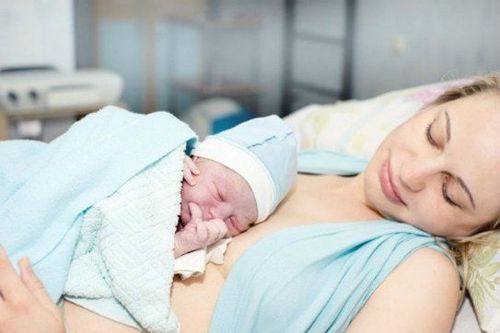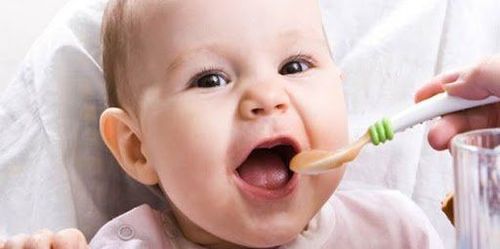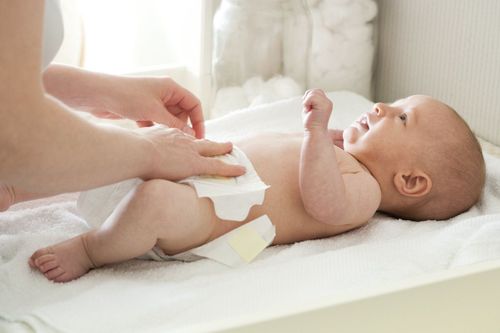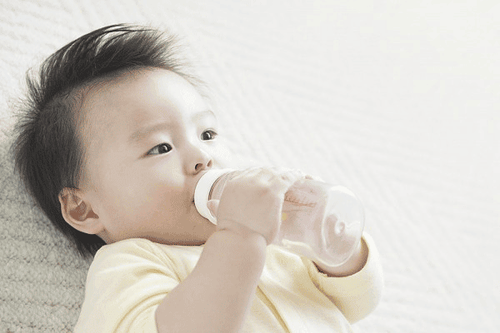This is an automatically translated article.
Finding out what milestones your baby can achieve in the first months of life can be a guide to help you take better care of your baby. However, each baby will have his or her own pace and development.
1. Developmental milestones 1 month old after birth
Your first days with a 1-month-old can be an uncertain time when it comes to feeding, changing diapers, settling down to sleep, and responding to your baby's cries. But over the next few weeks, your baby will start to pay more attention to your voice, face, and touch.
After birth, your baby can't focus further than 20 to 30cm, please create a suitable distance for your baby to look at your face. Black and white textures also make the baby pay more attention. Your baby's hearing is fully developed and he can turn to familiar sounds, such as your voice.
Baby can briefly lift his head and turn to one side when lying on his stomach. But when standing upright, the baby still needs support from the parents and the person holding the baby. Although the baby's arm is jerking, she can bring her hand close to her mouth.
Your role
Get to know your baby: Hold your baby, talk to him and learn how he signals when he is sleepy or hungry. Pay attention to your baby's expressions and respond to those requests. However, you should also not pamper the baby too much, as this can damage the baby.

Trẻ 1 tháng tuổi sau sinh cần được ôm và nói chuyện nhiều từ nố mẹ
Give your baby plenty of tummy time from the start when he's awake so he can strengthen his muscles. Encourage your baby to look away and pick up toys for himself. Make sure your baby gets plenty of time outside. Go for a walk with your baby and take him to the park or playground. Your baby will enjoy the outdoors, relaxing with you and being with other children. Get up close and make eye contact with your baby as you talk, sing, and read to him. Play simple games when your baby is awake and in the mood, such as taboos or imitating baby sounds. Learn the signs that your baby has had enough play and needs time to rest. Milestones
Each baby develops at his or her own pace, but talk to your pediatrician if your 1-month-old shows the following signs:
Feeding slowly or not well It looks like she's not exercising Focuses on eyes or observes moving things nearby Does not respond to bright lights Appears particularly hard or soft Does not respond to loud sounds
2. Development milestones at 3 months
Through the development of a 2-month-old baby, up to now, you are basking in the warmth of your baby's joyful smile. Your 3-month-old baby already knows how to imitate your facial expressions.
When the baby is 3 months old, you will no longer need to sponsor the baby. In the case of tummy tuck, the baby can lift the head and chest, even perform small push-ups that set the stage for rolling and crawling. Your baby can open and close her arms, shake toys, swing dangling objects, bring her hands to her mouth, and push down with her feet if you hold her upright.
Children's hand-eye coordination is improving. You'll notice your baby closely follows objects of interest and focuses on faces. Your child can already recognize you from across the room.

Trẻ 3 tháng tuổi không nhất thiết phải đỡ đầu
2.1 Your role
Don't worry that responding to your baby's interests can spoil her: Responding promptly gives her peace of mind and is loved. You can help your baby learn to self-soothe by pointing your thumb over her mouth or giving her a pacifier. Continue making tummy time your daily routine so your baby can practice new skills and strengthen his muscles. When your baby is on his tummy, offer him safe toys and objects that he can reach, hold, and explore. Give your baby lots of love and attention. Talk to your baby throughout the day, describe what you're doing and name familiar objects. Read books together. Share cuddles, play games, and encourage your baby to try to roll over, pick up toys, and "talk" to you.
2.2 Developmental milestones of 3-month-old babies
Each child develops at his or her own pace, but talk to your pediatrician if your 3-month-old has the following signs:
Can't support well Unable to grasp objects Unable to concentrate at moving objects Doesn't smile Doesn't respond to loud sounds Ignore new faces Seems annoyed by unfamiliar people or surroundings

Trẻ 3 tháng tuổi có thể cầm nắm đồ vật
3. Developmental milestones of 4 month old to 7 month old baby
Your baby is now fully engaged in the new world: She smiles, laughs, and babbles in "conversations" with you. At 6 months of age, your baby can roll over on his stomach or sit without your help. Baby uses the scratch handle to pull objects close and can hold toys and move them from hand to hand.
Baby is more sensitive to your voice and can heed your warnings when you say "no". Your baby now knows his name too and turns to look at you when you call him. Your baby begins to babble and imitate the sounds you make.
Peekaboo is a favorite game and babies love to find partially hidden objects. The baby now sees the world in color and can see further. If you move a toy in front of your baby, he'll follow it closely with his eyes. Or she can look at herself in the mirror and this is sure to make her feel very excited.
3.1 Your role
Your baby thrives on the interactions he has with you, so incorporate play into everything you do with him. Give your baby smiles and cuddles, and respond when she babbles to encourage her communication skills. Read a book together every day, naming objects you see in books and around you. Give your baby plenty of opportunities to reinforce new physical skills by helping her sit and position herself to play on her belly and back. Before your baby can crawl, make sure to keep him indoors and provide a safe environment for him to explore. Provide a variety of age-appropriate toys and household objects (like wooden spoons or cardboard boxes) for your baby to explore. Work on establishing a routine of sleep, feeding, and play times. By 6 months, your baby may be ready to start solids.

Trẻ từ 6 tháng tuổi có thể bắt đầu ăn dặm
3.3 Developmental milestones of 6-month-old children
Each child develops at his or her own pace, but talk to your pediatrician if your child has the following signs:
Unable to keep her head steady Unable to sit alone Does not respond to noise or laughter No affection for those closest to her No access to other young children Infants are generally more susceptible to respiratory illnesses, respiratory infections, and gastrointestinal infections If the baby starts solids early or the storage and preparation of milk is not secure. To protect children's health, parents should do well to exclusively breastfeed their babies for the first 6 months (if possible) and vaccinate on schedule. As soon as the child shows symptoms such as anorexia, fatigue, crying, it is necessary to take the child to the hospital to be consulted by a specialist for monitoring and treatment. The pediatric department at Vinmec International General Hospital is the address for receiving and examining diseases that infants and young children are susceptible to: viral fever, bacterial fever, otitis media, pneumonia in children. With a system of facilities, modern medical equipment, sterile space, minimizing the impact as well as the risk of disease spread, Vinmec will bring satisfaction to customers. and is highly appreciated by industry experts with:
Gathering a team of leading pediatricians: including leading experts with high professional qualifications (professors, associate professors, doctors, Master's degree), experienced, worked at major hospitals such as Bach Mai, 108.. The doctors are all well-trained, professional, conscientious, knowledgeable about young psychology. In addition to domestic pediatric specialists, the Department of Pediatrics also has the participation of foreign experts (Japan, Singapore, Australia, USA) who are always pioneers in applying the latest and most effective treatment regimens. . Comprehensive services: In the field of Pediatrics, Vinmec provides a series of continuous medical examination and treatment services from Newborn to Pediatric and Vaccine,... according to international standards to help parents take care of their baby's health from birth to childhood. Advanced techniques: Vinmec has successfully deployed many specialized techniques to make the treatment of difficult diseases in pediatrics more effective: neurosurgery - skull, stem cell transplant blood in cancer treatment. Professional care: In addition to understanding children's psychology, Vinmec also pays special attention to the children's play space, helping them to play comfortably and get used to the hospital's environment, cooperate in treatment, improve the efficiency of medical treatment.
Please dial HOTLINE for more information or register for an appointment HERE. Download MyVinmec app to make appointments faster and to manage your bookings easily.
Reference source: babycenter.com













